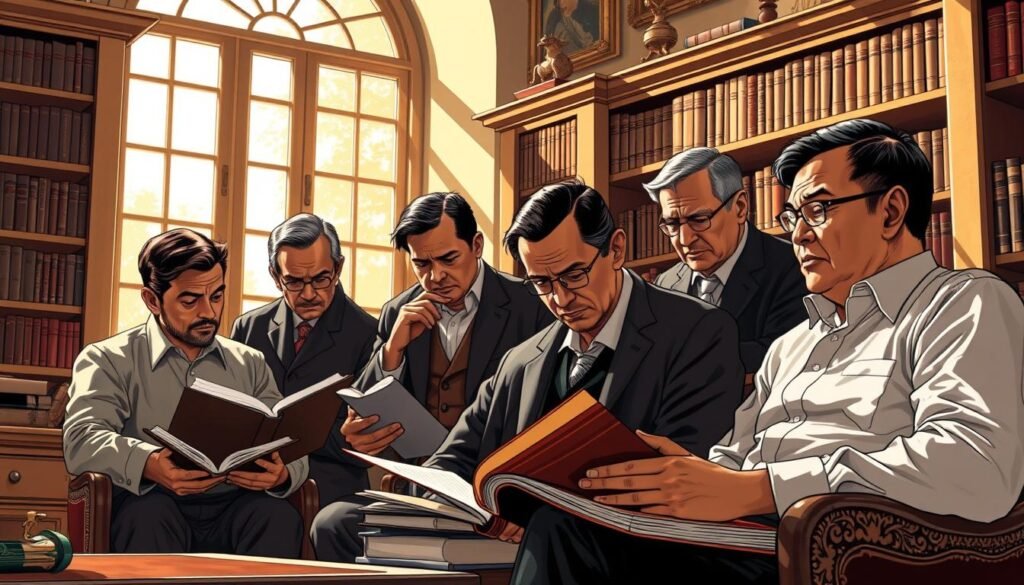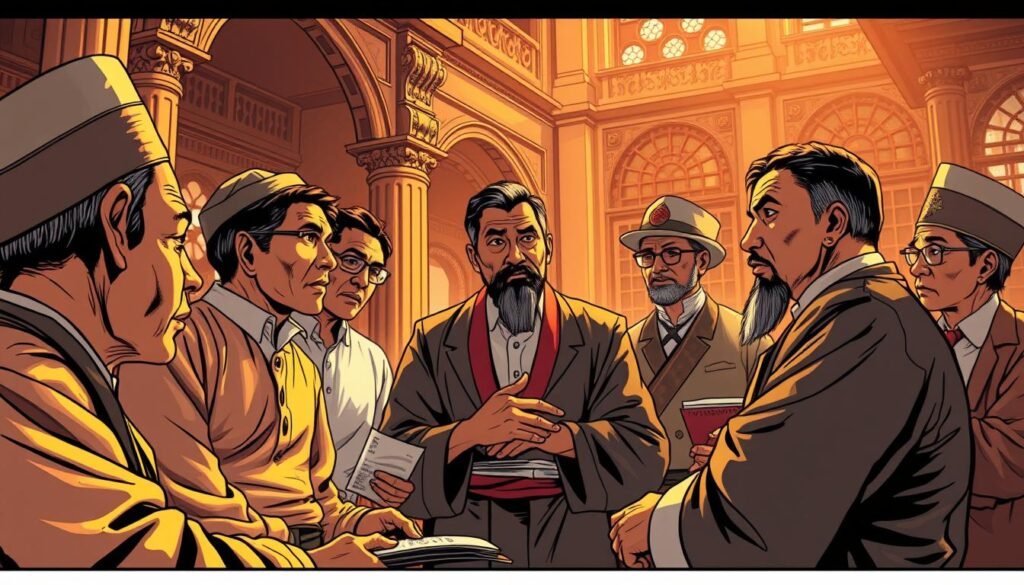By the late 19th century, the Philippines had one of the highest literacy rates in Asia. This was largely due to the Spanish colonial education system, which laid the foundation for a new class of thinkers. These individuals, known as the ilustrados, began to question the policies of their colonial rulers.
The ilustrados were deeply influenced by European liberal ideas. They sought to blend these progressive concepts with local traditions. This unique mix set the stage for a reformed social order in the Philippines.
Key figures like José Rizal, Marcelo H. del Pilar, and Graciano López Jaena emerged as pioneers of critical discourse. They challenged the traditional state dynamics imposed by colonial powers. Their efforts were instrumental in reshaping the colonial state structure.
The rise of these thinkers marked a pivotal period in the Philippine history. They embodied both local identity and progressive ideas, urging for equitable representation. Their legacy continues to influence the nation’s intellectual and political landscape.
Key Takeaways
- The late 19th century saw the Philippines with one of the highest literacy rates in Asia.
- The ilustrados were a class of educated individuals influenced by European liberal ideas.
- Key figures like José Rizal and Marcelo H. del Pilar pioneered critical discourse.
- They blended local traditions with progressive ideas to reshape the colonial state structure.
- Their legacy continues to influence the nation’s intellectual and political landscape.
Exploring the Spanish Colonial Context
The Spanish colonial era brought significant changes to the Philippines. During this period, reforms in education and politics laid the groundwork for a new class of thinkers. These changes were instrumental in shaping the nation’s future.

Colonial Educational and Political Reforms
Spanish authorities introduced systematic educational reforms. Schools and churches became centers of learning, fostering a critical and informed class. These institutions provided a platform for native populations to engage with new ideas.
Political structures also evolved. Legal frameworks, though designed to control, inadvertently encouraged awareness and resistance. This dual role of colonial policies sowed the seeds for future reform.
The Influence of European Liberal Ideas
European liberal ideas began to permeate the Philippine society. Thinkers adapted these concepts to local traditions, sparking intellectual debates. This blend of ideas propelled discussions on national autonomy and reform.
Reforms in curriculum and civic education further influenced these debates. For example, the introduction of new subjects encouraged critical thinking among students. This shift reshaped the cultural and academic landscapes of the time.
To learn more about the impact of colonial policies, visit this detailed analysis.
Filipino Intellectuals: Catalysts of Reform
The emergence of educated thinkers marked a turning point in Philippine history. These individuals, known as the ilustrados, played a pivotal role in challenging colonial norms and advocating for change. Their efforts reshaped the nation’s social, political, and educational landscapes.

Key Ilustrado Figures and Their Contributions
José Rizal stands out as one of the most influential figures of this era. His novels, Noli Me Tangere and El Filibusterismo, exposed the injustices of colonial rule. Rizal’s works inspired a generation to question authority and seek reform.
Marcelo H. del Pilar, another prominent ilustrado, used journalism as a tool for change. Through publications like La Solidaridad, he fostered a sense of unity and awareness among his peers. His writings emphasized the need for equitable representation and self-governance.
Mariano Ponce and Antonio Luna also made significant contributions. Ponce’s diplomatic efforts abroad helped garner international support for the Philippine cause. Luna, a military strategist, played a crucial role in organizing resistance against colonial forces.
Legacy in Philippine Nationalism and Education
The ilustrados’ impact extended beyond their lifetimes. Their ideas laid the foundation for modern Philippine nationalism. They championed educational reforms that emphasized critical thinking and civic responsibility.
Today, their legacy is preserved in academic curricula and national discourse. Schools and universities continue to teach their works, ensuring that their vision for a just and independent nation remains alive.
| Figure | Key Contribution | Impact |
|---|---|---|
| José Rizal | Literary works exposing colonial injustices | Inspired national consciousness |
| Marcelo H. del Pilar | Journalism and advocacy | Fostered unity and awareness |
| Mariano Ponce | Diplomatic efforts | Gained international support |
| Antonio Luna | Military strategy | Organized resistance |
Intellectual Discourse and the Shaping of National Identity
The intellectual debates of the 19th century played a pivotal role in shaping the Philippines’ national identity. These discussions were not just academic exercises but powerful tools for redefining the nation’s cultural and political landscape. Scholars and thinkers of the time blended local traditions with progressive ideas, creating a unique framework for nation-building.

This fusion of ideas challenged colonial norms and inspired a collective vision for the future. It laid the groundwork for a more inclusive state structure, where diverse voices could contribute to the nation’s progress.
Nation-Building Through Scholarly Engagement
Scholarly engagement during this period was instrumental in fostering a sense of unity and purpose. Thinkers like José Rizal and Marcelo H. del Pilar used their writings to critique colonial policies and advocate for reform. Their works became a rallying point for those seeking equitable representation and self-governance.
As Reynaldo Ileto noted, “The intellectual awakening of the time was not just about challenging authority but also about reclaiming a sense of identity.” This sentiment resonated deeply with the populace, fueling movements for independence.
For a deeper understanding of this transformative period, explore the rise of Filipino nationalism.
Critiques and Contemporary Reflections on Traditional Scholarship
Modern scholars have revisited the intellectual achievements of the past, offering fresh perspectives on their relevance today. Renato Constantino, for instance, emphasized the need for “partisan scholarship” to challenge colonial narratives and foster a nationalist consciousness.
Contemporary critiques highlight the importance of balancing traditional scholarship with modern interpretations. This approach ensures that historical narratives remain dynamic and inclusive, reflecting the evolving needs of the Philippine society.
As one scholar put it, “The past is not just a record of events but a guide for shaping the future.” This perspective underscores the enduring impact of intellectual discourse on the nation’s identity.
| Thinker | Contribution | Impact |
|---|---|---|
| José Rizal | Literary works exposing colonial injustices | Inspired national consciousness |
| Marcelo H. del Pilar | Journalism and advocacy | Fostered unity and awareness |
| Renato Constantino | Partisan scholarship | Challenged colonial narratives |
Today, the legacy of these thinkers continues to inspire new generations. Their ideas remain a cornerstone of the Philippines’ intellectual and political discourse, guiding the nation toward a more inclusive and progressive future.
Conclusion
The evolution of intellectual thought during the Spanish colonial period left a lasting mark on the Philippines. Thinkers of the time blended progressive ideas with local traditions, reshaping education, politics, and cultural identity. Their efforts laid the groundwork for modern reforms and a renewed sense of national pride.
Figures like José Rizal and Marcelo H. del Pilar championed equality and self-governance. Their works inspired movements for independence and continue to influence today’s national discourse. The legacy of these pioneers remains a cornerstone of the nation’s identity.
Understanding this heritage offers valuable insights for contemporary policy debates. It highlights the importance of intellectual engagement in shaping a just and inclusive society. For those interested in exploring this rich history, resources like this detailed analysis provide deeper context.
The struggles and achievements of the past remind us of the power of ideas. They serve as a source of inspiration for ongoing national development and future reforms.
FAQ
Who were the prominent figures during the Spanish colonial period in the Philippines?
Notable figures included José Rizal, Marcelo del Pilar, and Graciano López Jaena. They were key leaders in advocating for reforms and national identity.
How did European liberal ideas impact the Philippines during the Spanish era?
European liberal ideas inspired local scholars to push for political and educational reforms. These ideas fueled movements for equality and self-governance.
What role did education play in shaping Philippine nationalism?
Education empowered individuals to challenge colonial rule. It fostered critical thinking and a sense of unity among Filipinos, laying the groundwork for independence.
How did Filipino scholars contribute to nation-building?
Scholars used their writings and advocacy to promote national identity. They critiqued colonial policies and inspired movements for reform and independence.
What is the legacy of the Ilustrados in modern Philippine society?
The Ilustrados left a lasting impact on education, politics, and culture. Their efforts continue to influence discussions on governance and national pride.
How did intellectual discourse shape Philippine identity during the Spanish era?
Intellectual debates highlighted the need for cultural and political autonomy. They united Filipinos under a shared vision of independence and self-determination.
Source Links
- Education in the Philippines during Spanish rule
- Filipino Ilustrado scholarship: boding the nation?
- Catholicism in the Philippines during the Spanish Colonial Period 1521-1898 | 4 Corners of the World
- Philippine Revolution | Facts, Leaders, & Significance | Britannica
- Propaganda Movement | Facts, Definition, & History | Britannica
- Jose Rizal’s ideals and ideas
- Cultural Pride & Transmission: How Nonprofit Leaders Aid Filipinos & Shape Transnational Identity
- C:\Users\Admin\Desktop\Apr 17\D
- We need Filipino intellectuals
- Philippine Studies: Historical and Ethnographic Viewpoints
- Asian Place, Filipino Nation: A Global Intellectual History of the Philippine Revolution, 1887–1912. By Nicole CuUnjieng Aboitiz. New York: Columbia University Press, 2020. vii, 256 pp. ISBN: 9780231192156 (paper). | The Journal of Asian Studies | Cambridge Core

